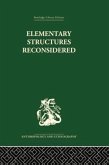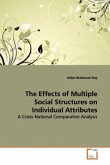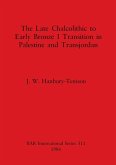Professor Lévi-Strauss's first major work, Les Structures élémentaires de la Parenté, has acquired a classic reputation since its original publication in 1949; and it has become the constant focus of academic debate about central theoretical concerns in social anthropology. It is, however, a long and difficult book for many students to read in French, and its arguments have consequently become known, even among professional anthropologists, largely through critical analysis. It was republished in a revised French edition in 1967 with a new foreword by the author, and it is this text with his further emendations that has been used in this translation. Lévi-Strauss applies his intellectual powers to the perennial problem of incest, which he elucidates by means of the concept of exchange as formulated by Marcel Mauss in his famous analysis of the gift (Essai sur le don, 1925). He distinguishes two elementary modes of exchange which govern not only the conventional variety of goods and services but also the transfer of women in marriage: these are "restricted" and "generalized" exchange. With a mass of ethnographic evidence he demonstrates how the formidable intricacy of marriage customs, comprising moral and jural ideas and institutions (which appear to be essentially arbitrary), can be seen as local and historical rules of exchange. Charles Lévi-Strauss traces these rules throughout a vast range of simple societies, chiefly in Australia and mainland Southeast Asia but also in the Americas, in Oceania, and in other parts of the world. To this survey he adds two extended sections on the great civilizations of China and India. He continues with a briefer consideration of the passage from elementary to complex structures, with particular reference to African societies, and concludes with a stimulating chapter on the principles of kinship, exchange as the universal basis for marriage prohibitions, and the formal relations between the sexes as part of a universe of communication. Although much of the work is technical, consisting of detailed analyses of types of social organization with which social anthropologists will be most familiar, it also contains much that will be of interest to psychologists, linguists, and philosophers, and to all who are interested in the possibility and the technique of the structural analysis of human activity. After the successes, moreover, of Lévi-Strauss's subsequent books-notably Structural Anthropology, Tristes Tropiques, Totemism, and The Savage Mind-this new edition of the work which founded his present outstanding reputation will have additional value as a further means of contact with one of the original minds of this century. The translation has been made by James Harle Bell and John Richard von Sturmer, of the University of New England, Australia, and by Rodney Needham, of the University of Oxford. Dr. Needham also acted as general editor and supplied the work with a new general index. He is the translator of Lévi-Strauss's Le Totemisme aujourd'hui and author of Structure and Sentiment (1962) and numerous papers which have contributed to the recognition of Professor Lévi-Strauss's work in the English-speaking world.
Hinweis: Dieser Artikel kann nur an eine deutsche Lieferadresse ausgeliefert werden.
Hinweis: Dieser Artikel kann nur an eine deutsche Lieferadresse ausgeliefert werden.








